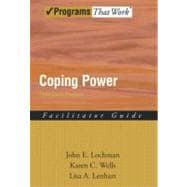
Note: Supplemental materials are not guaranteed with Rental or Used book purchases.
Purchase Benefits
Looking to rent a book? Rent Coping Power Child Group Facilitator's Guide [ISBN: 9780195327878] for the semester, quarter, and short term or search our site for other textbooks by Lochman, John E.; Wells, Karen; Lisa. Renting a textbook can save you up to 90% from the cost of buying.
| Introductory Information for Child Group Facilitators | p. 1 |
| Child Group Logistics | p. 31 |
| Coping Power Child Program | |
| Session 1: Group Structure and Behavioral Goal Setting Procedure | p. 53 |
| Session 2: Goal Setting - Part I | p. 61 |
| Session 3: Goal Setting - Part II | p. 67 |
| Session 4: Organizational and Study Skills | p. 71 |
| Session 5: Awareness of Feelings and Physiological Arousal Related to Anger - Part I | p. 79 |
| Session 6: Awareness of Feelings and Physiological Arousal Related to Anger - Part II | p. 85 |
| Session 7: Anger and Self-Control | p. 91 |
| Session 8: Using Self-Statements for Anger Coping - Part I | p. 97 |
| Session 9: Using Self-Statements for Anger Coping - Part II | p. 103 |
| Session 10: Using Self-Statements for Anger Coping - Part III | p. 107 |
| Session 11: Relaxation and Overcoming Barriers to Self-Control | p. 115 |
| Session 12: Perspective Taking - Part I | p. 121 |
| Session 13: Perspective Taking - Part II | p. 127 |
| Session 14: Perspective Taking - Part III | p. 135 |
| Session 15: Perspective Taking and Problem Solving | p. 143 |
| Session 16: Social Problem Solving - Part I | p. 151 |
| Session 17: Social Problem Solving - Part II | p. 157 |
| Session 18: Social Problem Solving - Part III | p. 163 |
| Session 19: Social Problem Solving - Part IV | p. 169 |
| Session 20: Group Creates Videotape - Part I | p. 175 |
| Session 21: Group Creates Videotape - Part II | p. 181 |
| Session 22: Group Creates Videotape - Part III | p. 185 |
| Coping Power Program | |
| Session 23: Review From Previous Year | p. 191 |
| Session 24: Organizational and Study Skills Review | p. 197 |
| Session 25: Application of Social Problem Solving to Teacher Conflict | p. 203 |
| Session 26: Application of Social Problem Solving to Both Making Friends and Being Friends With Others | p. 209 |
| Session 27: Application of Social Problem Solving to Group Entry and Negotiation With Peers | p. 215 |
| Session 28: Sibling Conflict and Problem Solving | p. 221 |
| Session 29: Application of Social Problem Solving to Peer Pressure | p. 227 |
| Session 30: Refusal Skills | p. 233 |
| Session 31: Problem Solving About Neighborhood Problems, Deviant Peer Groups, and Centrality of Group Membership | p. 239 |
| Session 32: Group Creates Peer Pressure Poster | p. 247 |
| Session 33: Positive Quality Development and Peer Relationships | p. 251 |
| Session 34: Review and Termination of the Coping Power Program | p. 255 |
| End of the Year Party | p. 261 |
| References | p. 263 |
| About the Authors | p. 277 |
| Table of Contents provided by Ingram. All Rights Reserved. |
The New copy of this book will include any supplemental materials advertised. Please check the title of the book to determine if it should include any access cards, study guides, lab manuals, CDs, etc.
The Used, Rental and eBook copies of this book are not guaranteed to include any supplemental materials. Typically, only the book itself is included. This is true even if the title states it includes any access cards, study guides, lab manuals, CDs, etc.